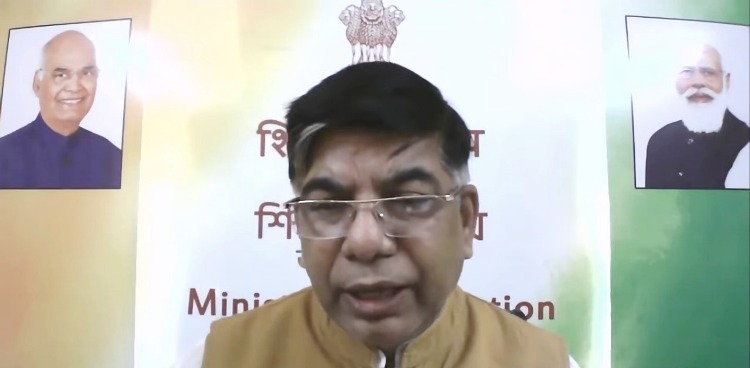Subhas Sarkar addresses Assistive Technology Innovation Showcase for inclusive Education
Shri Subhash Sarkar highlighted the provision of NEP-2020 that mandates equitable & inclusive education so that every citizen has an equal opportunity to dream, thrive and contribute to the growth of the nation.

- Country:
- India
Minister of State for Education Shri Subhas Sarkar today addressed the Assistive Technology Innovation Showcase for inclusive Education organised by Department of School Education and Literacy, Ministry of Education in association with Atal Innovation Mission, NITI Aayog.
Shri Subhash Sarkar highlighted the provision of NEP-2020 that mandates equitable & inclusive education so that every citizen has an equal opportunity to dream, thrive and contribute to the growth of the nation. He stated that schools & school complexes are working to provide all Children with Special Needs (CWSN) accommodations and support mechanisms tailored to suit their needs, ensuring their full participation and inclusion in the classroom.
Stressing on the need for innovation in the assistive tech space Dr. Abhay Jere, Chief Innovation Officer, AICTE mentioned about the textbooks conversion into Indian Sign Language (ISL) and ministry’s innovation ecosystem to take forward assistive-tech innovations through incubation and acceleration support.
Shri Manoj Kumar, Founder Social Alpha highlighted that assistive technology for education should not only be considered as a social venture but it has a solid business model of its own and the same needs to be developed further.
Speaking on this occasion, Mr Chapal Khasnabis, Head of Assistive technology, Medical Devices and Diagnostics, WHO highlighted access to assistive technology and global best practices and stressed how India can become truly inclusive.
The highlight of the event was presentation by 12 start-ups, having compilation of top solutions in the form of applications or devices which have been created by young entrepreneurial minds of India. These young minds are leveraging frontier technologies such as AI to provide socially relevant solutions to aid the learning of children who suffer from various disabilities such as Autism, Dyslexia, Hearing and Speech impairment disorder, Visual impairment disorder, Cerebral Palsy etc.
The event also featured innovations from young innovators from schools. Children from Atal Tinkering Labs presented their innovations ranging from innovative device to convert sign language to speech to a device that scans and converts printed text in any book or newspaper into an audio clip.
A panel moderated by Prof PVM Rao of IIT Delhi and consisting of Prof. Anupam Basu, NIT,Durgapur, Prof. Anil Prabhakar and Prof. Sujata, IIT Madras participated in the discussion about research and innovations and partnership required for an inclusive education. Prof. Rao focused on the need for promotion of research in assistive devices and its inclusion in curriculum. He talked about the need of flexibility in examinations and assessments and of taking different aspects into consideration for a true inclusive education. Prof. Prabhakar expressed his concerns that while as a country we have several solutions in assistive technologies, we need to reach scale and focus on functional disabilities to make solutions acceptable at scale. He also talked about the need to foresee the needs of students in colleges and universities who are presently in schools. Prof. Sujata provided details on the assistive device landscape where the solutions are concentrated on the ends of spectrum- one end with low tech and low-cost devices, on the other hand hi-tech and expensive assistive devices. The research at R2D2 center at IIT Madras has focused on challenges such as affordability, awareness, access and appropriateness of the solutions.
Dr Chintan Vaishnav, Mission Director, Atal Innovation Mission commended the innovators and highlighted how can an Innovation Ecosystem be built for assistive technology in education. He stressed upon support through AIM’s innovation network of incubation centres and community innovation centres.
Closing the event Shri Santosh Sarangi, Additional Secretary, MoE highlighted the challenges and way forward in mainstreaming the assistive technology innovations. He highlighted the role of the ministry to scale-up and institutionalize solutions.
The Event designed to promote and give start-ups a platform to showcase innovations received an overwhelming response. Youtube views crossed 2+ lakh views before the event culminated.
Ms Ritu Sain, Joint Secretary, Ministry of Education, gave the closing remarks and as an end note called upon continued work to leverage tech-based interventions for early identification and support to children with special needs in rural and remotest part of the country. She also stressed that Ministry of Education will work with these start-ups to get product pilot in place on merit and indicated upcoming similar events to solve sectoral challenges.
(With Inputs from PIB)
- READ MORE ON:
- Indian Sign Language
- Subhas Sarkar
- NITI Aayog
- AICTE










